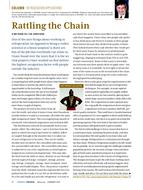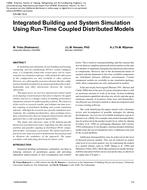Results from previous testing of this refrigerator/freezer using a 750 Btu/h compressor and several zeotropic mixtures revealed a performance enhancement up to 16% above that of hydrofluorocarbon R-134a. In the study presented in this paper, the Lorenz-Meutzner (LM) refrigerator/freezer equipped with a 1060 Btu/h compressor, two evaporators, and two intercoolers was experimentally tested in an environmental chamber according to the Association of Home Appliance Manufacturers/Department of Energy (AHAM/DOE) testing standards using several hydrofluoropropane-based zeotropic mixtures. The results are compared to baseline testing with R-134a and results obtained using the 750 Btu/h compressor. Hydrofluorocarbons R-245ca/R-152a performed comparably to R-134a. R-245ca/hydrocarbon R-270 (cyclopropane C3 H6 ) outperformed all zeotropic mixtures and R-134a by at least 12.2 ±0.7%. All refrigerants performed better using the larger compressor due to its inherently better efficiency. Refrigerant samples taken during refrigerator/freezer operation revealed substantial composition shifts (e.g., a 30% running composition shift of R-134a in the R-245ca/R-134a mixture). Sand et al. (1993) obtained an approximately 20% energy reduction using steady-state on-cycle energy consumption results; a comparison was made between chlorofluorocarbon R-12 and a hydrofluorocarbon R-32/hydrochlorofluorocarbon R-124 mixture. Lorenz and Meutzner (1975), originators of the Lorenz-Meutzner refrigerator/freezer design, state that the following parameters influence the optimum performance of the design: (1) heat exchanger size, (2) capillary tube length, (3) refrigerant charge, and (4) compressor size.
Units: Dual
Citation: ASHRAE Transactions, vol. 105, pt. 1
Product Details
- Published:
- 1999
- Number of Pages:
- 11
- File Size:
- 1 file , 1.1 MB
- Product Code(s):
- D-7510


